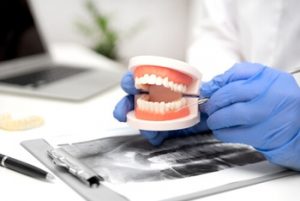Dental injuries can be frightening, and one of the most urgent situations is when a tooth is knocked out. Whether it happens during contact sports, a fall, or an accident, how you respond in those first few minutes can determine whether the tooth can be saved. Knowing what to do when a tooth is knocked out can make the difference between keeping your natural tooth and needing a replacement like a dental implant.
In this article, we’ll walk through the essential steps of how to handle a knocked-out tooth, the differences between baby teeth and permanent teeth, and why early intervention is so important.
Stay calm and act quickly
When a tooth is knocked out, time is critical. A tooth that is reimplanted within one hour has the best chance of successful reimplantation. Staying calm helps you act quickly and make the right choices for emergency dental care.
Know the difference: Baby teeth vs permanent teeth
Not all knocked-out teeth are treated the same way.
 Baby teeth
Baby teeth
If a baby tooth is knocked out, it should not be placed back into the socket. Reimplanting a baby tooth can damage the developing adult tooth underneath. In these cases, gently rinse your child’s mouth with warm water, apply a cold compress if there is swelling, and schedule an emergency appointment with a dentist to make sure there are no injuries to the gum or other teeth.
Permanent teeth
If an adult tooth is knocked out, it’s a true dental emergency. Immediate action to preserve and protect the tooth gives the highest chance of saving it.
How to safely handle a knocked-out tooth
A tooth is very delicate, especially the root surface. Here are the right steps to take if a permanent tooth is knocked out:
- Pick up the tooth by the crown
Always hold the tooth by the chewing surface, not the root. Touching the root can damage the tissue that is needed for the tooth to heal back into place. - Gently rinse the tooth if dirty
Use warm water or saline to rinse off dirt or debris. Do not scrub, use soap, or dry the tooth. Even tap water should be avoided if possible because it can harm the cells on the root surface. - Keep the tooth moist
A tooth must never dry out. If you can, put the tooth back into the socket by gently pushing it into place. Once it is back in, bite down gently on a piece of gauze or cloth to help hold it steady.If you cannot reinsert it, store the tooth in milk, saline solution, or a specialized emergency tooth preservation kit. If none of these are available, place the tooth in the mouth between the cheek and gum to keep it wet with saliva.
Why moisture matters for tooth survival
The living tissues on the root surface of an avulsed tooth begin to die if the tooth is left dry. Keeping the tooth wet in milk or another suitable solution offers the best protection until you can see a dentist. Milk has a similar pH and nutrient balance to saliva, making it one of the best options when an emergency preservation kit isn’t available.
Seeking emergency dental care
Once the tooth is kept moist, get to a dentist or emergency department as soon as possible. Ideally, the tooth should be reimplanted within an hour for the highest chance of success. A dentist will:
- Reinsert the tooth into the socket if you haven’t already
- Take an x-ray to check bone and gum health
- Stabilize the tooth with a splint attached to neighboring teeth
- Plan regular follow-up appointments to monitor healing
If the tooth cannot be saved, your dentist may discuss treatment options such as dental implants or bridges to restore function and appearance.
What to avoid when a tooth is knocked out
In the rush of an emergency, it’s easy to make mistakes that can reduce the chances of saving the tooth. Here are some common errors to avoid:
- Do not handle the root surface
- Do not scrub or scrape the tooth
- Do not let the tooth dry out
- Do not place a baby tooth back into the socket
Broken teeth vs knocked-out teeth
Not every dental injury means a tooth is fully avulsed. Sometimes a tooth is broken or chipped instead of completely knocked out. A broken tooth still requires urgent care, but it is handled differently. Gently rinse your mouth, save any broken pieces if possible, and see your dentist quickly for repair. Treatment may involve bonding, crowns, or in severe cases, extraction and replacement.
Preventing future dental emergencies
While not every accident can be prevented, there are ways to protect your teeth:
- Wear a custom mouthguard during contact sports
- Practice good oral hygiene to keep gums and teeth strong
- Schedule regular dental checkups to address small issues early
- Teach children how to safely play and protect their teeth
These simple steps reduce the risk of having teeth knocked out in the first place.
When early intervention makes all the difference
If a tooth is knocked out, acting quickly gives the best chance for successful reimplantation. From keeping the tooth moist in milk to gently pushing it back into the socket, early intervention is key. Even if the tooth cannot be saved, seeing a dentist right away ensures you receive the right emergency care and can explore options like dental implants to restore your smile.
Final thoughts
A knocked-out tooth is one of the most urgent dental emergencies. Whether it involves a baby tooth or an adult tooth, knowing the right steps can protect your oral health and give you the best chance of saving your natural tooth. The key is simple: stay calm, act quickly, keep the tooth wet, and see a dentist as soon as possible.
References:
https://www.nhs.uk/conditions/knocked-out-tooth/
https://health.clevelandclinic.org/must-act-fast-tooth-gets-knocked
https://www.mayoclinic.org/first-aid/first-aid-tooth-loss/basics/art-20056635
https://www.betterhealth.vic.gov.au/health/conditionsandtreatments/dental-injuries-tooth-loss
https://www.nhsinform.scot/illnesses-and-conditions/injuries/dental-injuries/broken-or-knocked-out-tooth/
https://www.colgate.com/en-us/oral-health/dental-emergencies-and-sports-safety/what-to-do-with-a-knocked-out-tooth


 How to Handle a Knocked-Out Tooth: What You Need to Do Right Away
How to Handle a Knocked-Out Tooth: What You Need to Do Right Away  How to Get Rid of a Tooth Pain Fast: Your Go-To Guide for Soothing Relief
How to Get Rid of a Tooth Pain Fast: Your Go-To Guide for Soothing Relief  Can Toothache Cause Eye Pain? Understanding the Connection and Relief
Can Toothache Cause Eye Pain? Understanding the Connection and Relief  Will a Heating Pad Help a Toothache? Understanding Pain Relief Options
Will a Heating Pad Help a Toothache? Understanding Pain Relief Options  How Long to Leave Garlic on a Toothache: A Comprehensive Guide
How Long to Leave Garlic on a Toothache: A Comprehensive Guide  How Soon Will Antibiotics Stop Tooth Pain? Understanding the Timeline
How Soon Will Antibiotics Stop Tooth Pain? Understanding the Timeline  Tooth Extraction When Root is in Sinus Cavity: Understanding the Process and Potential Risks
Tooth Extraction When Root is in Sinus Cavity: Understanding the Process and Potential Risks  Do Cavities Cause Bad Breath? Understand the Connection and Solutions
Do Cavities Cause Bad Breath? Understand the Connection and Solutions 


